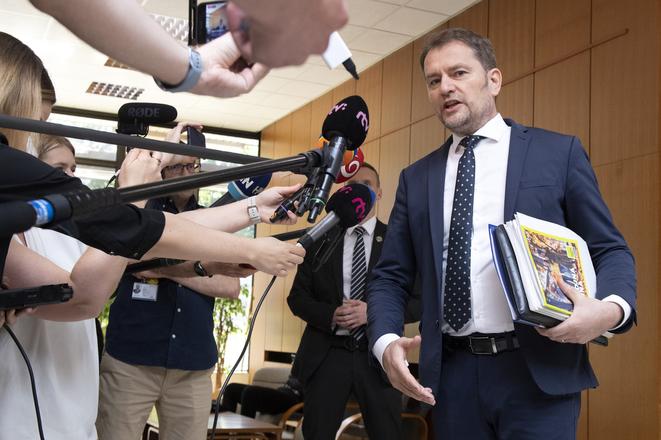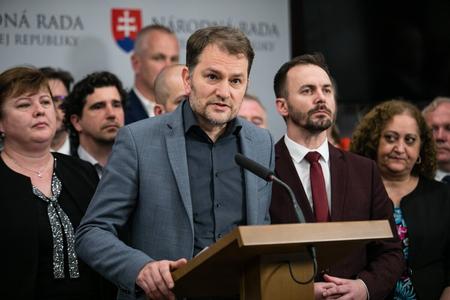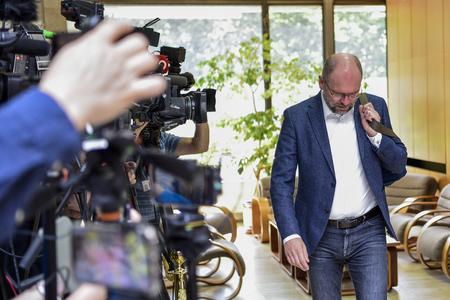Prime Minister Eduard Heger is trying to tell people that the coalition is stuck in no serious dispute over anti-inflation financial aid to families. Yet, it is unsure whether the MPs will actually approve it.
“I’m working on getting the SaS [a coalition party] on board,” said Heger (OĽaNO) a week ago. After the government passed the anti-inflation package for families on Wednesday, May 18, he flaunted an agreement of three parties within the coalition, but the three parties have never refused to support the package.“I’m working on getting the SaS [a coalition party] on board,” said Heger (OĽaNO) a week ago. After the government passed the anti-inflation package for families on Wednesday, May 18, he flaunted an agreement of three parties within the coalition, but the three parties have never refused to support the package.
“This was in the making for three months,” said the prime minister.
Anti-inflation measures such as the increased tax bonus for children and child allowance and a financial contribution for after-school activities were supported by ministers from OĽaNO, Sme Rodina and Za Ľudí.
Four SaS ministers, however, did not vote for the package proposed by Finance Minister and OĽaNO chair Igor Matovič. Moreover, SaS lawmakers are not going to support the measures in the parliament.
This could mean a problem in the approval process of the package for the coalition government.
SaS chair and Economy Minister Richard Sulík has threatened to use veto on the government-approved temporary Russian crude oil tax in the parliament. Matovič wants to use money collected from this tax - about €300 million a year - to fund financial contributions for after-school activities.
However, according to the coalition agreement, Sulík’s veto would mean that the SaS would block the proposal and the other three coalition parties would not be allowed to discuss it further.
According to Sulík’s earlier statements, overriding the veto in raising taxes would, in turn, mean that the SaS will no longer be governed by the obligations of the coalition agreement.
Before the coalition council
The dispute between Matovič and Sulík appeared serious before the government’s meeting on May 18. OĽaNO chair said that Sulík’s attitude towards the Russian crude oil tax, which Sulík planned to stop, resembled “treason”.
Sulík reiterated that raising taxes was the last straw for him.
If the SaS stopped honouring the coalition agreement, the government could not be sure about the support of 19 SaS lawmakers for its proposals in the parliament. The government would thus lose a majority.
Sulík insisted on blocking the higher Russian crude oil tax before the meeting on Wednesday. “I repeat that we will veto all tax proposals and that includes the proposal to introduce an oil tax,” he said. The Sas vetoed nothing on May 18, but the party could still use the veto as soon as on May 19 when the parliament starts debating anti-inflation proposals.
“We have a promise from our coalition partners that they will respect our right to veto if we use it in the parliament,” said Sulík after the May 18 meeting.
The economy minister added that he would want to meet with the management of Slovnaft, a Bratislava refinery, before the May 19 parliamentary session and find out what their reaction to the tax would be.
In his own words, he wants to assure that money from this new tax would be spent well. In exchange for the new tax, Sulík insists on lowering other taxes.
Matovič did not submit a proposal to tax a hundred wealthy Slovak firms more to the government on May 18. He had said that he would use this money to cover another part of his anti-inflation package, which should cost around €1.2 billion next year.
Even after several anti-inflation proposals were passed by the government, it remains uncertain how the state is going to pay for the package.
Fast-track procedure
The parliament should discuss the Russian oil tax and anti-inflation measures on May 19.
The MPs should vote on the measures in a fast-track procedure. If the SaS did not use its veto on the oil tax, MPs could vote on the proposals this week.
The SaS has already announced it will not support financial contributions for after-school activities, criticised by Education Minister Branislav Gröhling (SaS), and the tax bonus.
On Wednesday, Sulík did not answer whether the SaS would help other coalition parties in passing anti-inflation measures by reducing the quorum through their absence during the vote. In such a case, fewer votes would be sufficient to approve the proposals.
Otherwise, the coalition would have to seek support among non-affiliated MPs or in the opposition. However, Matovič is ruling out negotiating with them.
What the government approved
On Wednesday, the government approved the increase of tax bonuses for children, higher child allowances, and contributions for after-school activities.
The tax bonus for children under the age of 15 should increase to €100, and €50 for children above the age of 15. The first increase should be seen in July, when the tax bonus is supposed to increase to €70 for younger children and €40 for over 15 year-old's. The draft law will also determine the percentage of the tax base up to which it will be possible to claim the bonus.
Child allowances should increase to €30 from August and €50 from the new year.
The government approved the contribution for leisure activities in the amount of €50 for children aged 5 to 18. According to the proposal, it should be paid from January of next year.
©Sme





